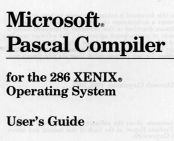Loading AI tools
Implementation of Pascal programming language From Wikipedia, the free encyclopedia
Microsoft Pascal is a discontinued implementation of the Pascal programming language developed by the Microsoft Corporation for compiling programs for running on its MS-DOS and Xenix[5] operating systems and, in later versions, on OS/2 (like many other Microsoft programming tools, albeit they are only capable of generating 16-bit programs for the latter).
 Microsoft Pascal Compiler for the 286 XENIX Operating System User's Guide, part number 8511I-330-05, document number 020-092-013, from 1985. | |
| Original author(s) | Microsoft Corporation |
|---|---|
| Initial release | 1980[1][2] |
| Stable release | |
| Operating system | MS-DOS, Xenix, OS/2 |
| Type | Pascal programming language |
| License | Commercial |
Microsoft Pascal version 1.0 was released in 1980.[1] The last version of Microsoft Pascal to be released was version 4.0 in 1988,[1] when Microsoft Pascal was superseded by Microsoft QuickPascal, a cheaper development tool that Microsoft produced in order to compete with Borland's Turbo Pascal.
Microsoft Pascal was priced at $300,[4] whereas QuickPascal was priced between $25 and 50, and the differences between the two were similar to those between Microsoft BASIC Professional Development System and Microsoft QuickBASIC.[6]
Unlike the ISO-compliant Microsoft Pascal product, QuickPascal went after the ultimate compatibility with Turbo Pascal. This included not only source-level compatibility, but rather complete binary compatibility with widely available unit libraries for the competitor's compiler. To achieve this level of compatibility, QuickPascal moved away from the common file format (OBJ) and tool set (LINK, LIB) shared by Microsoft's other compilers.
Seamless Wikipedia browsing. On steroids.
Every time you click a link to Wikipedia, Wiktionary or Wikiquote in your browser's search results, it will show the modern Wikiwand interface.
Wikiwand extension is a five stars, simple, with minimum permission required to keep your browsing private, safe and transparent.